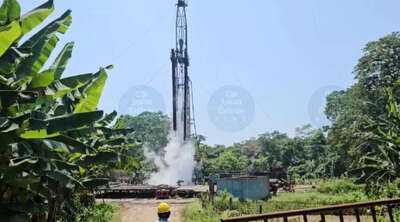
Safety Issues in India's Hydrocarbon Sector
The recent blowout at ONGC's Rudrasagar Field has sparked significant concerns regarding safety protocols and regulatory oversight within India's hydrocarbon industry, especially concerning projects managed by private companies. This incident, which took place at Well No. RDS-147 on June 12 during a perforation operation aimed at initiating production from a new reservoir layer, has raised alarms.
High-risk operations like these are expected to be conducted under strict safety measures, with multiple protective barriers in place. Experts are now questioning how these barriers, which typically include at least two safety measures, failed at the same time. This is not an isolated incident; similar occurrences have been reported under private management.
A comparable blowout at Oil India Limited's Baghjan well in 2020, also overseen by a private contractor, resulted in severe environmental and social repercussions. That incident led to a catastrophic leak of gas and oil, a significant fire, and the emission of harmful pollutants, resulting in loss of life, destruction of wildlife habitats, and displacement of communities.
Investigations following the Baghjan incident uncovered failures at all levels, including planning, execution, and adherence to standard operating procedures. The environmental damage was substantial, affecting over 1,600 hectares of wetlands, 523 hectares of grasslands, 172 hectares of rivers and streams, and 213 hectares of forests. Scientific assessments indicated that these ecosystems might take a decade or longer to recover to 70-80% of their original state. The lessons learned from Baghjan were clear: outsourcing complex and high-risk tasks to private entities without robust oversight can lead to disastrous outcomes.
Now, five years later, the Rudrasagar blowout highlights the same systemic issues: inadequate risk assessment, poor well control, and insufficient supervision. These incidents are not mere accidents; they are preventable failures resulting from regulatory negligence.
Blowouts are infrequent in modern petroleum operations due to advancements in technology and stringent safety protocols. The fact that they continue to occur in India underscores the ongoing presence of systemic problems. While the private sector contributes essential innovation, efficiency, and investment to the energy sector, its involvement must be grounded in strong regulatory frameworks and unwavering safety standards.
Government agencies and public sector undertakings must ensure that private contractors comply with international standards, undergo independent safety audits, and employ adequately trained personnel. These incidents serve as a stark reminder that economic liberalization must be accompanied by regulatory modernization.
Enhancing institutional oversight, enforcing accountability, and requiring transparent safety evaluations are not optional; they are essential. Only through these measures can India guarantee that private participation in energy exploration does not jeopardize lives, ecosystems, or long-term sustainability.
-
How to submit your Arji to Khatu Shyam Ji without visiting the temple

-
From glowing skin to weight loss, juice of this thing with carrots is no less than a miracle

-
Consuming these 6 fruits will eliminate stains, will improve the skin

-
Group Captain Shubhanshu Shukla created history, the first Indian to reach ISS

-
Vivo X200 Fe Launching Official Confirm in India; Microsite is also live
